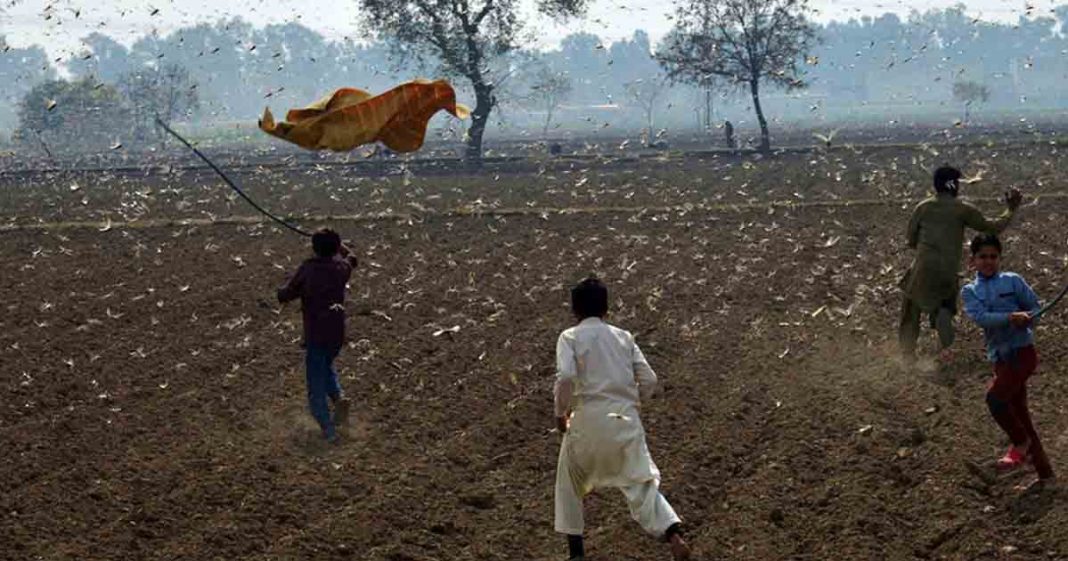Since last year, the desert locust has been posing an unprecedented threat to Pakistan’s agriculture sector, and the response of the government was slow and ineffective. It is only recently that the government has responded practically and declared a nationwide emergency, appealed for assistance from the international community and expressed its readiness to participate in the regional commission to save its agrarian economy from the threat.
Besides Pakistan, neighboring countries are equally affected by the locust invasion. The pest has ruined crops across East Africa, the Arabian Peninsula and parts of India this year.
Experts raised the alarm about the probability the pests might increase beyond imagination in the region during the upcoming monsoon season. Its uncontrolled spread holds the potential to cause a food cataclysm in the region while the world faces a global health pandemic.
Read more: How swarming locust can affect agriculture production in Pakistan?
Desert locusts have been entering in bevies from Pakistan’s southwest, consuming whatever vegetation they find in their path. Locust swarms can fly up to 150km (90 miles) a day, and a small swarm “can eat enough food to feed 35,000 people in one day,” according to the United Nation’s Food And Agriculture Organization.
Last summer, locusts caused immense damage (more than 13.8 percent) to wheat, oilseeds, pulses, fodder and vegetables in Sindh. Currently, it has ruined large areas in Balochistan and Sindh, damaged crops rapidly in southern Punjab, and is now headed towards central Punjab.
Farmers have expressed their vulnerability as well as the inability to save their crops from the locust attack. Beating drums and revving tractors to scare away locusts is neither appropriate nor a long-term solution. Without the government’s sustained national policy and cooperation from neighboring states, locust control is impossible.
Last week, Pakistan announced it would participate in the UN’s Food and Agriculture Organization’s Commission for Controlling the Desert Locust in Southwest Asia (SWAC)
Ironically, the Department of Plant Protection (DPP), which originated for locust control in the 1950s, has appeared unprepared to adopt timely precautionary measures. Instead of concentrating on homegrown control measures through innovative approaches, DPP has been engaged in the lucrative regulatory work of pesticide imports. The kickbacks in outdated pesticides and faulty seeds imports are an open secret. Indeed, without reforms in the department and accountability of the officials, the agrarian economy has remained vulnerable to pests.
One positive development is that the Pakistani ruling elite has realized the looming threat caused by locusts. Provincial and federal governments announced strategies to curb the increasing invasion of the insects in the agrarian districts of Sindh, Punjab and Balochistan. They have put together an aerial insecticidal spray operation, deputed ground teams and also announced budgets to salvage crops from further damage and to provide relief to affected farmers.
The locals’ tactic in Okara district, Punjab, to prevent the locust’s fast-breeding process seems economical. They have been catching the pests and selling them to the poultry feed industry. They can also be used as fodder for fish farms that have mushroomed in Punjab in recent years.
Read more: Locusts being fed to chickens in Pakistan: a creative solution
The desert locust is a protein-rich insect and people can even eat it. In fact, people have used it for food in the Thar desert of Sindh. They catch it quickly during the night because after sunset, the insects form clusters on trees and plants and become motionless in the dark, especially when temperatures fall.
The locust is not a domestic pest. Even if we control it now, it will return next summer from neighboring countries. The pests don’t recognize borders and therefore, without cooperation with neighboring states, controlling their spread is impossible.
Last week, Pakistan announced it would participate in the UN’s Food and Agriculture Organization’s Commission for Controlling the Desert Locust in Southwest Asia (SWAC) and will be cooperating with India, Iran and Afghanistan under this commission. During weekly meetings, officials share data and devise cooperative strategies to combat the locust outbreak in the entire region.
Read more: Tiddi Dal: Can Pakistan & India jointly combat the worst locust attack?
In summary, a sustained national strategy to control the pest is imperative. Besides, regional countries will have to chalk out a cooperative approach shepherded by SWAC for the permanent prevention of the desert locust outbreak.
Dr. Zafar Nawaz Jaspal is Associate Professor, School of Politics and International Relations, Quaid-i-Azam University, Islamabad. He is an advisor on Non-Proliferation to SASSI, London, and a course coordinator at Foreign Services Academy, Pakistan. He can be reached at jaspal_99@hotmail.com. This piece was first published in Arab News Pakistan Edition under a different title. It has been republished with permission. The views expressed in this article are the author’s own and do not necessarily reflect Global Village Space’s editorial policy.














